


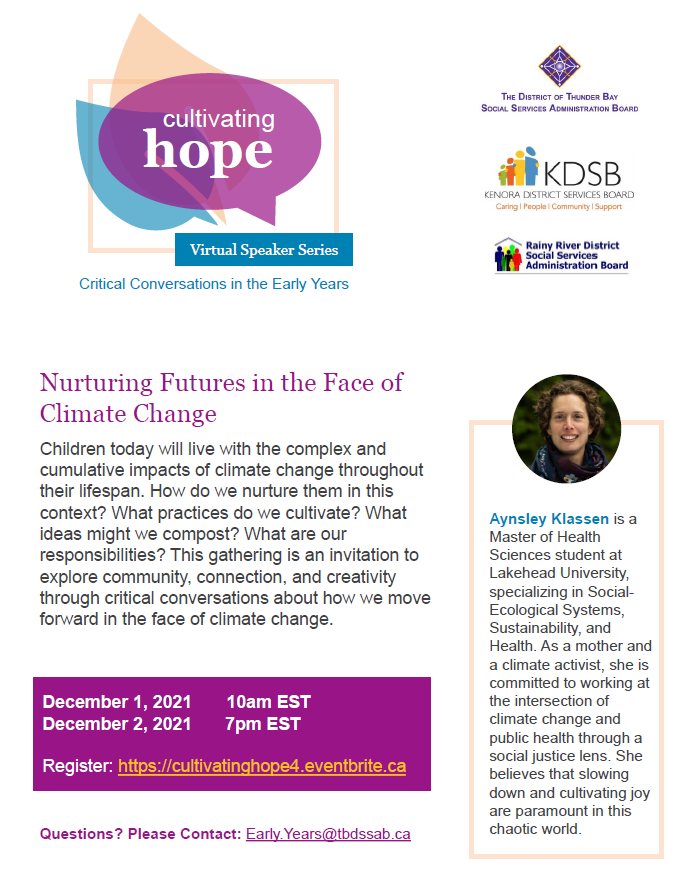

View our Calendar to access the links to register.
The Ministry of Education has worked in collaboration with Reggio Children to translate the booklet, Indications, into French. “The Indications aim to give substance and voice to the rights of children, parents, and teachers for a high quality, participatory education capable of promoting increasing awareness that the role of the infant-toddler centres and preschools is to produce a culture of education and not just to offer educational servicesŌĆØ, and to ensure that these are ŌĆ£places where the rights to well-being and learning of both children and adults are put into practiceŌĆØ.

Click on the links below to view the letter from the Ontario Reggio Association to learn about how you can access this resource.
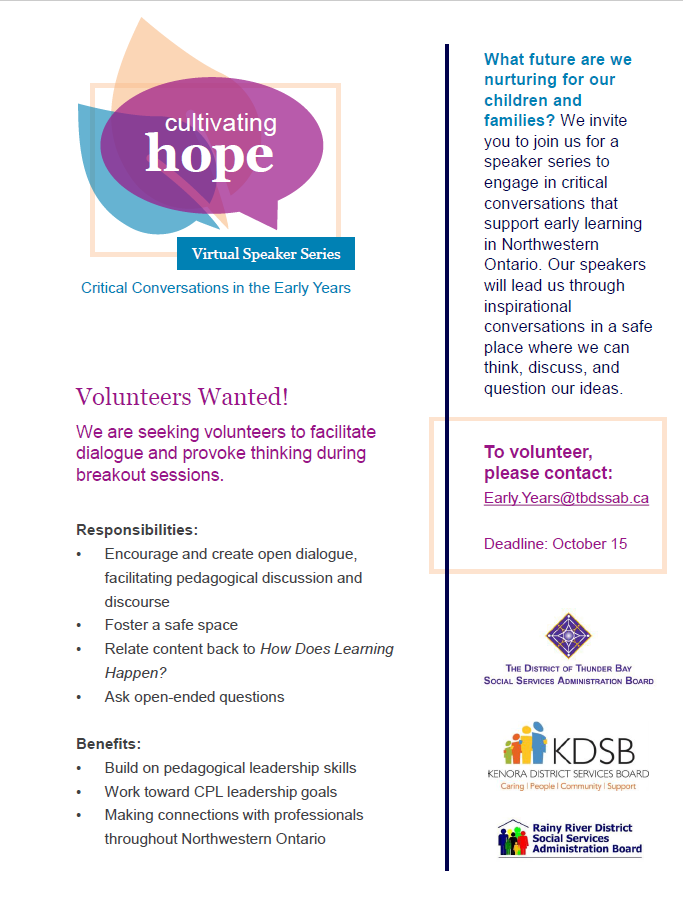
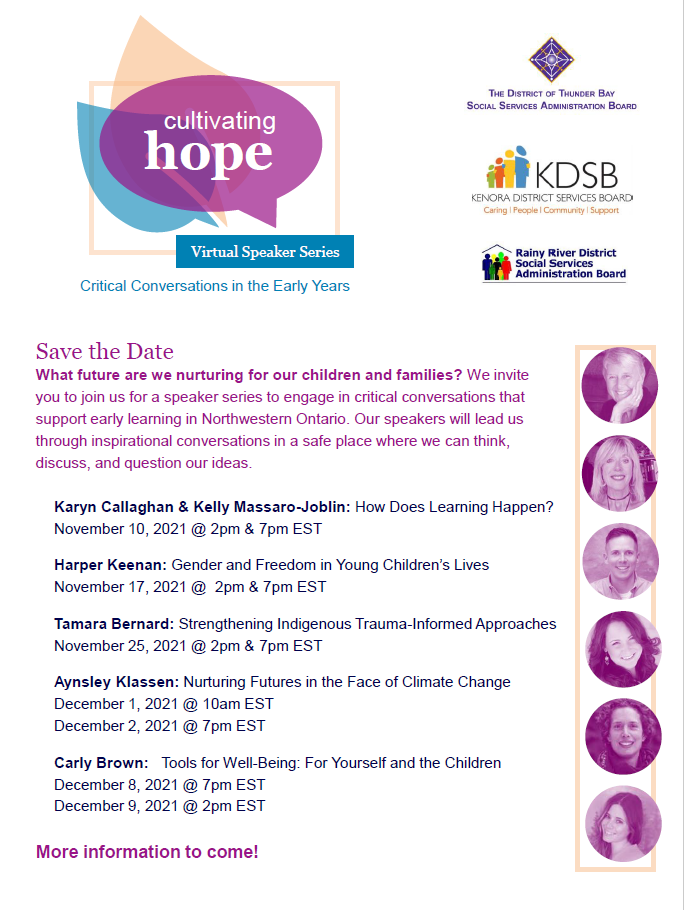
What future are we nurturing for our children and families? We invite you to join us for a speaker series to engage in critical conversations that support early learning in Northwestern Ontario. Our speakers will lead us through inspirational conversations in a safe place where we can think, discuss, and question our ideas.
Karyn Callaghan & Kelly Massaro-Joblin: How Does Learning Happen?
November 10, 2021 @ 2pm & 7pm EST
Harper Keenan: Gender and Freedom in Young ChildrenŌĆÖs Lives
November 17, 2021 @ 2pm & 7pm EST
Tamara Bernard: Strengthening Indigenous Trauma-Informed Approaches
November 25, 2021 @ 2pm & 7pm EST
Aynsley Klassen: Nurturing Futures in the Face of Climate Change
December 1, 2021 @ 10am EST
December 2, 2021 @ 7pm EST
Carly Brown: Tools for Well-Being: For Yourself and the Children
December 8, 2021 @ 7pm EST
December 9, 2021 @ 2pm EST
More information to come!
ŌĆ£Listening is a complex state. It involves the abandoning of oneself as we come to know that we are only one being within this vast universe.ŌĆØ(CARLINA RINALDI, 2001)
The Reggio Emilia Aotearoa New Zealand (REANZ) has extended access to their free webinar about listening differently. This is part of a two-part series with the first webinar being available for three more months and the second webinar becoming available on August 30th.
These webinars are ŌĆ£an opportunity for educators to reflect on the critical role of listening and how this permeates the everyday choices we make when we work with children. Kirsty Liljegren and Fiona Zinn will draw on the thinking of the Reggio Emilia Approach alongside their personal perspectives which hold listening at the heart of practiceŌĆØ (REANZ, 2021).
You can access the first webinar here: https://www.reanz.org/events

The Indigenous Professional Learning Team is extending an invitation to early years professionals to attend our upcoming Knowledge Exchange Gathering.
July 21, 2020 from 2:00 pm ŌĆō 3:30 pm EDT
This month Elders, Knowledge Keepers and early years professionals will share about the importance of Indigenous song and dance in relation to belonging, wellbeing, expression and engagement for children in the early years.
Be sure to register by Monday July 19, 2020 at 4:00 pm EDT.
Click HERE to register.
We are excited to announce that Lori Huston will be sharing her graduating work from the Master of Education in Early Childhood Education program at UBC. Please e-mail us at early.years@tbdssab.ca to join us for this amazing learning opportunity.
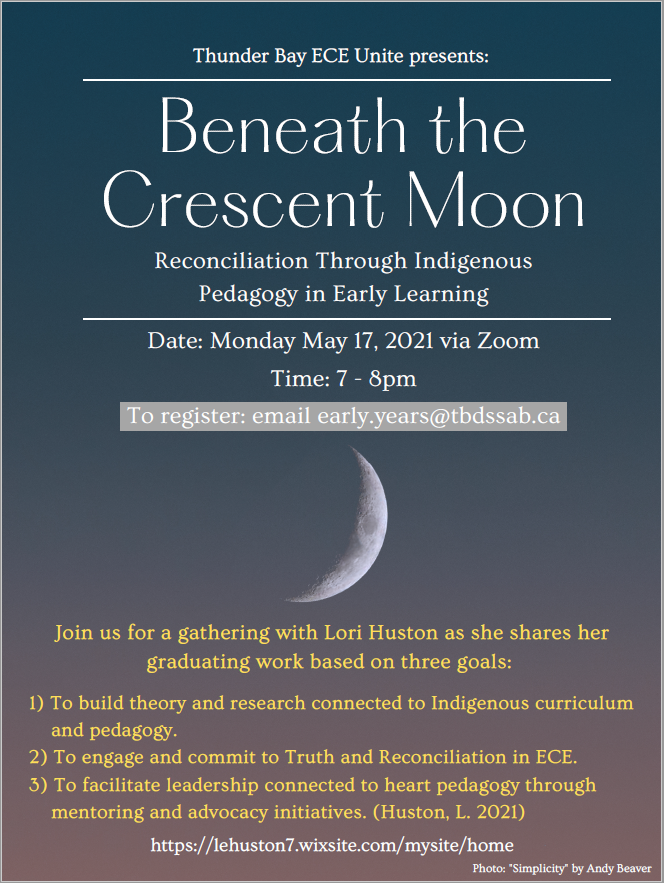
We had a wonderful conversation last week about pedagogical documentation. Three educators joined us who each play a different role in our community ŌĆō one educator in child care, one supervisor of a before and after school program, and one EarlyON coordinator. This diversity of experience made for a unique dialogue and the opportunity to share different perspectives. We all read the article, Curiosity, Curriculum, and Collaboration Entwined: Reflections on Pedagogical Documentationby Pat Tarr.
As we discussed the article, an interesting dialogue came up around interrupting childrenŌĆÖs play. Traditionally, we have been taught to ask children open-ended questions ŌĆō ŌĆ£what are you building?ŌĆØ ŌĆ£what do you think will happen when you stack another block on top?ŌĆØ We felt that this can sometimes interrupt and change the direction of childrenŌĆÖs play, and we agreed that we should be thoughtful in deciding when is a good time to enter childrenŌĆÖs play and ask questions. It was said that we need to give ourselves permission to take a step back and observe more.
As the conversation continued, we began thinking about how educators pick and choose what they feel is worth documenting. Tarr (2010) states in the article that ŌĆ£what we choose to document reveals and reflects back to us what we consider important, as well as help us to see ourselves as educators within the educational relationshipŌĆØ (p. 12). This conversation reminded some of us about another article by Pat Tarr that talked about ethics and biases in pedagogical documentation. We shared mixed feelings about this article, and some of us plan to dig a little deeper to decide if or how the information fits with our practice. You can access the article here: Reflections and Shadows: Ethical Issues in Pedagogical Documentation,.
Finally, one of the educators bravely shared her documentation with us. She wondered, ŌĆ£is this documentation?ŌĆØ There isnŌĆÖt one right way to document childrenŌĆÖs learning; taking time to practice documenting and experimenting with different techniques can help educators to feel more confident. We discussed our questions and curiosities about this documentation, and a new idea was shared about ŌĆ£stories from homeŌĆØ (Hedges, 2010). Essentially, ŌĆ£stories from homeŌĆØ is a form that goes home for families to fill out and share a story that took place with their child outside of the early learning setting ŌĆō itŌĆÖs getting the families to document!! We discussed that this would be a great way of getting to know children and families better, and building stronger connections between, for example, child care and home.
Let us know what you think about these ideas or about the articles provided in the chat below.
References
Hedges, H. (2010). Blurring the boundaries: Connecting research, practice and professional learning. Cambridge Journal of Education, 40(3), 299-314. http://dx.doi.org/10.1080/0305764X.2010.502884
Tarr, P. (2010). Curiosity, curriculum, and collaboration entwined: Reflections on pedagogical documentation. Canadian Children, 35(2), 10-14.
Tarr, P. (2011). Reflections and shadows: Ethical issues in pedagogical documentation. Canadian Children, 36(2), 11-16.

ŌĆ£there are many stories to be told, each one of which deserves listening to and each one of which can be questioned or contestedŌĆØ (Moss, 2019, p. 7)
One of the influential people for us currently is Peter Moss who is an emeritus professor of early childhood provision at UCL Institute of Education, University College London. Moss is the author of many articles and books regarding early childhood education.
Peter Moss likes to talk about early childhood education in relation to stories. He quotes Bruner (1990) when he says ŌĆ£mankind has an innate tendency to communicate and to make sense of existence through stories (Moss, 2019, p. 4). Synonyms for ŌĆ£storyŌĆØ are discourse and narrative. Moss talks about ŌĆ£dominant discoursesŌĆØ and ŌĆ£alternative narrativesŌĆØ in early childhood education. He describes a dominant discourse as one that has become particularly influential, or ŌĆ£mainstreamŌĆØ (Moss, 2019). Dominant discourses have a powerful influence as they insist they are ŌĆ£the only way to think, talk and behaveŌĆØ (Moss, 2019, p. 5).
We live in a time where there is a very strong dominant discourse of neoliberalism. Neoliberalism has framed much of our lives over the past 30-40 years (Moss, 2020) and has become deeply entrenched in our thinking. At its core, neoliberalism focuses on standardisation and accountability (Baltodana, 2012) and can be summed up by the quote ŌĆ£what gets measured gets managedŌĆØ (Moss, 2019). This may help to explain why we have been focused on quality for so long. Quality is well within the neoliberal discourse as it identifies standards and is a measurement for accountability. Therefore, quality too is a dominant discourse.
Peter Moss, and many others, are suggesting that we need to come up with alternatives to these dominant discourses. He reminds us that we all have different perspectives and values which means that there does not have to be one right answer or one single way of doing things. In particular, he suggests that the way we think about and do education does not have one right answer. He believes that those who feel there is only one right way to do education are denying diversity and complexity (Moss, 2020).
As a result of this thinking, Peter Moss has adopted the concept of ŌĆ£alternative narrativesŌĆØ. Alternative narratives include other theories and perspectives (stories) that resist mainstream thinking. They allow for multiplicity and choice in the way we view early childhood education, and what we believe is important. As an example, alternatives to mainstream thinking include: Reggio Emilia, Waldorf, Montessori, and Te Wh─üriki. We are not looking to have you recreate one of these pedagogies; our new approach is not about recreating and making more of the same. We are hoping that you will learn alongside us, listen to the many different ways of thinking about early childhood education, and define what is important to you and what ŌĆ£storyŌĆØ you would like to tell about early childhood education.
Peter Moss does attest that it can be difficult and unsettling to break free from dominant discourses and embrace alternatives because the dominant discourses (e.g. neoliberalism and quality) have become so commonplace. However, we, as a community, are experimenting with an alternative. We are confident that there are better alternatives to quality and we believe in the potential of our community (you) to think in new and revolutionary ways. As stated by Foucault (1988), ŌĆ£As soon as one no longer thinks things as one formerly thought them, transformation becomes very urgent, very difficult and quite possibleŌĆØ (as cited by Moss, 2020, p. 106)
References
Baltodana, O. (2012). Neoliberalism and the demise of public education: The corporatization of schools of education. International Journal of Qualitative Studies in Education, 25, 1487ŌĆō1507. doi:10.1080/09518398.2012.673025
Moss, P. (2019). Alternative narratives in early childhood: An introduction for students and practitioners. Routledge.
Pacini-Ketchabaw, V. & Moss, P. (2020, July). Early childhood pedagogy: Veronica Pacini-Ketchabaw interviews Peter Moss. Journal of Childhood Studies, 45(2), 98-111.
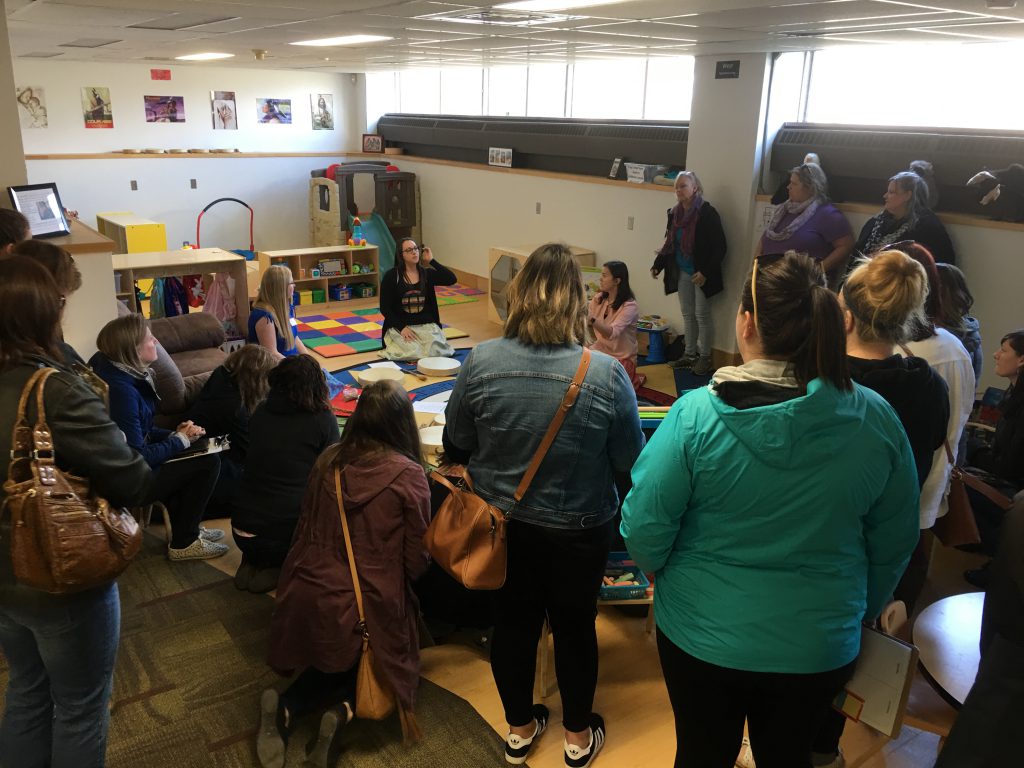
The District of Thunder Bay Social Services Administration Board recently offered a survey regarding staff well-being. Some of the feedback from this survey was to support staff through re-connecting and opportunities to support mental health.
We know that many of the staff working in child care and EarlyON programs in our communities have strengths and talents to inspire, showcase, and bring comfort to others. Do you or does your centre have a skill to share? A story to tell? Perhaps you have a colleague that has a gift that you recognize others should see. Whether itŌĆÖs documentation, cooking, crafting, or storytelling, we would like to hear what you could share virtually among our community!
Submit your idea to us at early.years@tbdssab.ca